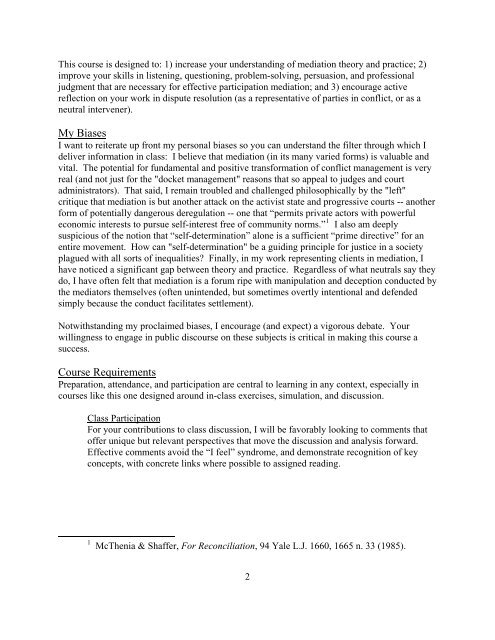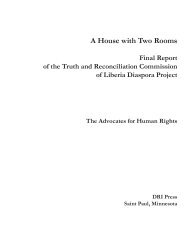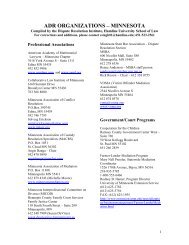MEDIATION SKILLS - Hamline Law
MEDIATION SKILLS - Hamline Law
MEDIATION SKILLS - Hamline Law
Create successful ePaper yourself
Turn your PDF publications into a flip-book with our unique Google optimized e-Paper software.
This course is designed to: 1) increase your understanding of mediation theory and practice; 2)<br />
improve your skills in listening, questioning, problem-solving, persuasion, and professional<br />
judgment that are necessary for effective participation mediation; and 3) encourage active<br />
reflection on your work in dispute resolution (as a representative of parties in conflict, or as a<br />
neutral intervener).<br />
My Biases<br />
I want to reiterate up front my personal biases so you can understand the filter through which I<br />
deliver information in class: I believe that mediation (in its many varied forms) is valuable and<br />
vital. The potential for fundamental and positive transformation of conflict management is very<br />
real (and not just for the "docket management" reasons that so appeal to judges and court<br />
administrators). That said, I remain troubled and challenged philosophically by the "left"<br />
critique that mediation is but another attack on the activist state and progressive courts -- another<br />
form of potentially dangerous deregulation -- one that “permits private actors with powerful<br />
economic interests to pursue self-interest free of community norms.” 1 I also am deeply<br />
suspicious of the notion that “self-determination” alone is a sufficient “prime directive” for an<br />
entire movement. How can "self-determination" be a guiding principle for justice in a society<br />
plagued with all sorts of inequalities? Finally, in my work representing clients in mediation, I<br />
have noticed a significant gap between theory and practice. Regardless of what neutrals say they<br />
do, I have often felt that mediation is a forum ripe with manipulation and deception conducted by<br />
the mediators themselves (often unintended, but sometimes overtly intentional and defended<br />
simply because the conduct facilitates settlement).<br />
Notwithstanding my proclaimed biases, I encourage (and expect) a vigorous debate. Your<br />
willingness to engage in public discourse on these subjects is critical in making this course a<br />
success.<br />
Course Requirements<br />
Preparation, attendance, and participation are central to learning in any context, especially in<br />
courses like this one designed around in-class exercises, simulation, and discussion.<br />
Class Participation<br />
For your contributions to class discussion, I will be favorably looking to comments that<br />
offer unique but relevant perspectives that move the discussion and analysis forward.<br />
Effective comments avoid the “I feel” syndrome, and demonstrate recognition of key<br />
concepts, with concrete links where possible to assigned reading.<br />
1 McThenia & Shaffer, For Reconciliation, 94 Yale L.J. 1660, 1665 n. 33 (1985).<br />
2
















